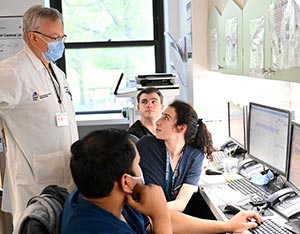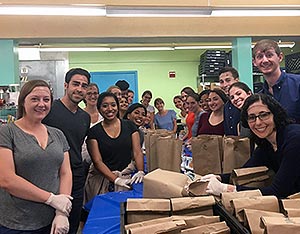The Pediatrics Residency Training Program, located at the Icahn School of Medicine at Mount Sinai, is as vibrant and stimulating as the city we live and work in. The mission of our pediatric residency program is to train driven, intellectually curious pediatricians with diverse experiences who deliver expert, compassionate clinical care through the seamless integration of science, advocacy, and education.
Our curriculum provides the building blocks for a comprehensive, well-rounded education in pediatrics while maintaining both balance and flexibility. We will equip you with the skills you need for a successful career through exposure to primary care pediatrics and subspecialty care. Our graduates go on to a wide variety of careers, including academic medicine, primary care practice, and public health. Furthermore, while Icahn School of Medicine at Mount Sinai (ISMMS) is known for its exceptional faculty, the unique learning environment of New York City offers and experience few other institutions can match.
Residents experience a real-world environment with an unparalleled mix of pathologies, cultures, languages, and socioeconomic backgrounds. It’s an extraordinary population to not just care for, but learn from.
̶ Jessica Reid-Adam, MD, Program Director
In addition, your training at Mount Sinai Kravis Children’s Hospital will allow you to learn from the brightest minds in general pediatrics as well as an array of subspecialties. Mount Sinai Kravis Children’s Hospital has been listed among the country’s top children’s hospitals in the U.S. News & World Report® Best Children's Hospitals 2025-26 rankings. Our most highly ranked specialties are diabetes and endocrinology, gastroenterology and GI surgery, and nephrology. The Icahn School of Medicine at Mount Sinai is a hub of collaboration and discovery – our institution ranks fourth in NIH funding per principal investigator among private medical schools (2018 AAMC ranking) – and Mount Sinai Kravis Children’s Hospital shares ISMMS’s passion for scientific discovery. We are ranked #11 for National Institutes of Health funding for Departments of Pediatrics in U.S. medical schools, and #1 in New York State (Blue Ridge Institute for Medical Research).
As a resident in our program you will have access to mentorship and guidance from countless researchers and innovators, both within our department and within the institution. From the Mount Sinai Pediatric Precision Medicine Initiative to the Pediatrics Visiting Doctors and Complex Care Program, you will be trained by thought leaders who are looking to change the way children are cared for in New York City and beyond.
We invite you to join us.

Why Us
Gain an overview of our program from the
Pediatric Residency Program Director
Meet Our Leadership
Meet the group of talented individuals that
comprise our leadership team

Life at Mount Sinai
We strive to provide a balanced, vibrant, and
stimulating environment among the challenges
of residency life

See Who We Are
Welcome from our Pediatric Co-Chief Residents